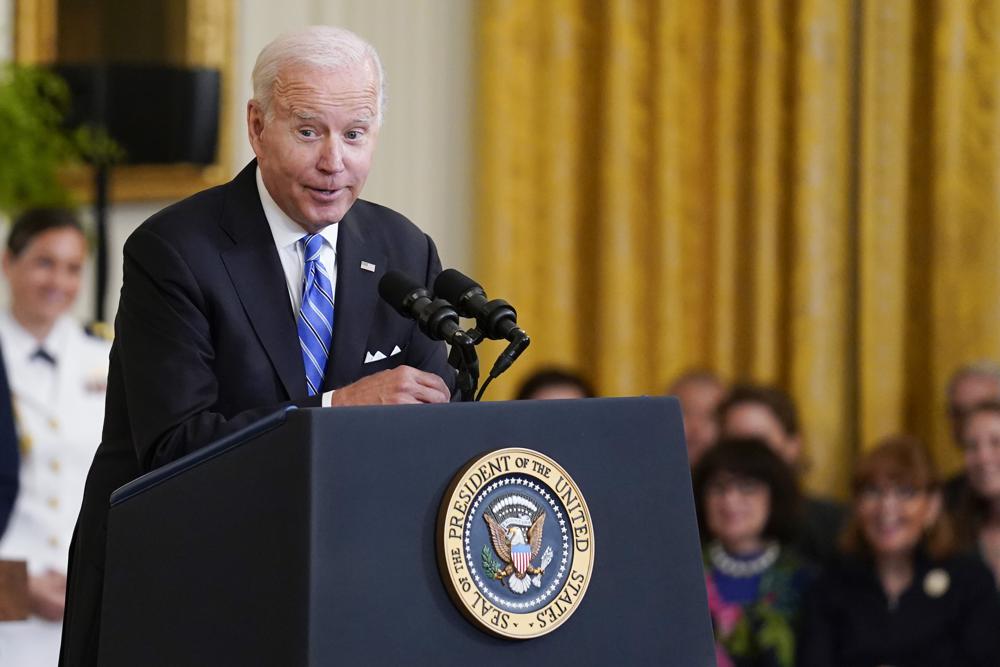President Joe Biden will take executive action Friday to protect access to abortion, the White House said, as he faces mounting pressure from fellow Democrats to be more forceful on the subject after the Supreme Court ended a constitutional right to the procedure two weeks ago.
The White House said Biden will speak Friday morning “on protecting access to reproductive health care services.” The actions he was expected to outline are intended to try to mitigate some potential penalties women seeking abortion may face after the ruling but are limited in their ability to safeguard access to abortion nationwide.
Biden is expected to formalize instructions to the Departments of Justice and Health and Human Services to push back on efforts to limit the ability of women to access federally approved abortion medication or to travel across state lines to access clinical abortion services.
Biden’s executive order will also direct agencies to work to educate medical providers and insurers about how and when they are required to share privileged patient information with authorities — an effort to protect women who seek or utilize abortion services. He will also ask the Federal Trade Commission to take steps to protect the privacy of those seeking information about reproductive care online and establish an interagency task force to coordinate federal efforts to safeguard access to abortion.
The White House said it will also convene volunteer lawyers to provide women and providers with pro bono legal assistance to help them navigate new state restrictions after the Supreme Court ruling.
The order, after the high court’s June 24 ruling that ended the nationwide right to abortion and left it to states to determine whether or how to allow the procedure, comes as Biden has faced criticism from some in his own party for not acting with more urgency to protect women’s access to abortion. The decision in the case known as Dobbs v. Jackson Women’s Health Organization overturned the court’s landmark 1973 Roe v. Wade ruling.
Since the decision, Biden has stressed that his ability to protect abortion rights by executive action is limited without congressional action.
“Ultimately, Congress is going to have to act to codify Roe into federal law,” Biden said last week during a virtual meeting with Democratic governors.
The tasking to the Justice Department and HHS is expected to push the agencies to fight in court to protect women, but it conveys no guarantees that the judicial system will take their side against potential prosecution by states that have moved to outlaw abortion.
“President Biden has made clear that the only way to secure a woman’s right to choose is for Congress to restore the protections of Roe as federal law,” the White House said. “Until then, he has committed to doing everything in his power to defend reproductive rights and protect access to safe and legal abortion.”
(AP)












4 Responses
The Supreme Court did NOT says that abortions a prohibited, and they didn’t even say there is anything bad about abortions. All they said is that they are addressed by the Constitution, and therefore they are among the areas of responsibility that belong to the state. A Federal statute (and kal v’chomer, an executive order from the president) can neither ban, nor protect abortions. Considering that there is fairly good chance there will be a pro-life president in the near future (note that since 2000, there has been a pro-life president roughly half the time), the Democrats should be happy that he also won’t be allowed to legislate against abortion, any more than Biden can mandate abortion.
If you hold the Congresses can require states to allow delivery of interstate shipments banned by their own laws, that will have a major impact on many other goods and services (and it is blue states in particular that are most likely to act against interstate commerce, e.g. California restricting certain types of cars, and also eggs farmed in factory farms, which are at risk).
No new law is needed to establish a right of one American to travel to a different state, and under existing law a state can not make it a crime to do something out of state (thus a state that bans gambling can’t make it illegal for its residents to gamble out of state). No need law is needed since this is established law.
The Interstate Commerce clause would certainly allow Congress to establish a nationwide regulatory system for abortion, which would preempt all state and local laws. But there is no way it would pass the senate, and next year there will very likely be Republican majorities in both houses. Then Congress could use the same authority to ban abortion nationwide (as the supreme court affirmed in _Raich_); but it won’t.
if a girl has the right for abortion because it is her and let me decide
how could enforce vaccine mandates
he is a azis punim